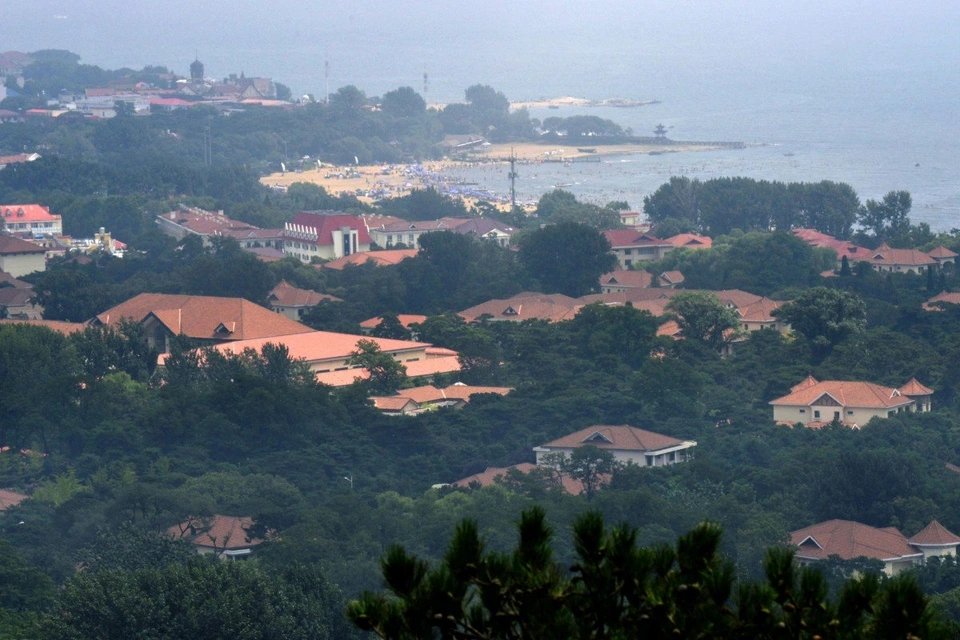(Dan Tri) – US-China relations, protests in Hong Kong, Taiwan elections and economic development may be `hot` topics at the meeting of Chinese leaders in Beidai
Beidaihe coastal resort (Photo: Kyodo)
If only at first glance, the most important time in the `political season` in China seems to fall in the last 3 months of the year, when the country’s `headquarters` gather in the capital Beijing to attend.
However, in reality, the political atmosphere in China is `hottest` in the days of August, when current and retired leaders meet in Beidaihe, a famous northern coastal resort.
Located about 300 km east of the capital, Beidaihe resort opens a relaxing space for Chinese leaders, especially those who are retired but still influential, so that they can exchange ideas together.
Traditionally, there is usually no official announcement of the Beidaihe meeting.
Beidaihe Resort began to become an important political location since the late Chairman Mao Zedong, an avid swimmer, decided to establish a `summer office` for officials there.
The importance of the summer meeting at Beidaihe has diminished under President Xi Jinping.
However, most analysts still believe that Beidaihe plays an important role in Chinese politics, opening up opportunities for Mr. Xi to review and adjust his policies.
“Beidaihe is where senior leaders can meet in informal meetings to exchange their views on important policies, so Beidaihe still plays a very important role in
Topics `heated up` the Bac Dai Ha meeting

Mr. Deng Xiaoping (right) swam at Beidaihe in July 1987.
This year’s Beidaihe meeting is likely to be watched very closely as the Chinese leadership is facing a series of unprecedented challenges.
Kerry Brown, professor of Chinese studies at King’s College, London, believes that the focus of this year’s Beidaihe meeting will be on the general deterioration of the international environment, especially the US-US relationship.
“I think this meeting will focus more on external issues than before, because not even Mr. Xi or anyone else knows how to deal with an America whose leadership is divided.
This year’s Dai Beihe meeting took place after more than a year of retaliatory tariffs between the world’s two largest economies and escalating confrontation between the two rival powers in nearly every field.
The US has imposed a 25% tax on about half of the value of exports from China to the US and threatened to continue to impose taxes on all Chinese goods if trade negotiations fail.
Although President Xi Jinping and President Donald Trump agreed to resume trade negotiations at a meeting on the sidelines of the G20 conference in Japan in June, the prospect of reaching an agreement between the two countries remains uncertain.
According to Professor Brown’s prediction, when there is no clear answer to the question of how to deal with challenges from the US, Mr. Xi Jinping may spend the summer meeting in Beidaihe to listen.

President Trump and President Xi Jinping met in Japan in June (Photo: Reuters)
Expert Wu said that the ongoing protests against the extradition bill in Hong Kong are also a priority issue on the agenda of Chinese leaders in Beidaihe.
In recent weeks, the protests have turned into large-scale movements, threatening the Chinese central government’s control over Hong Kong.
The protests forced the Hong Kong government to stop the extradition bill.
In addition to Hong Kong, the Taiwan issue is also expected to appear in discussions in Beidaihe.
Relations between the two sides of the Taiwan Strait have reached their lowest point since Tsai Ing-wen took over as leader of the island in 2016. One of the things that worries Beijing is the relationship between the US and Taiwan.
China still hopes that cross-Strait relations will improve after the upcoming Taiwan leadership election.
The Trump administration clearly views leader Tsai Ing-wen and her party as important allies in the US `Indo-Pacific` strategy.
With only 6 months left until the election in Taiwan, mainland Chinese leaders need to take some measures to ensure the victory of the candidate supported by Beijing.
Besides, during the meeting in Beidaihe, Chinese policymakers may discuss measures to revive the Chinese economy.
China’s economic growth fell to 6.2% from April to June, the lowest since March 1992.
Analysts believe that President Xi Jinping will take advantage of the meeting in Beidaihe to reach consensus among the Chinese leadership on how to handle the political impact of the trade war with the US, the protests
Success
According to SCMP
